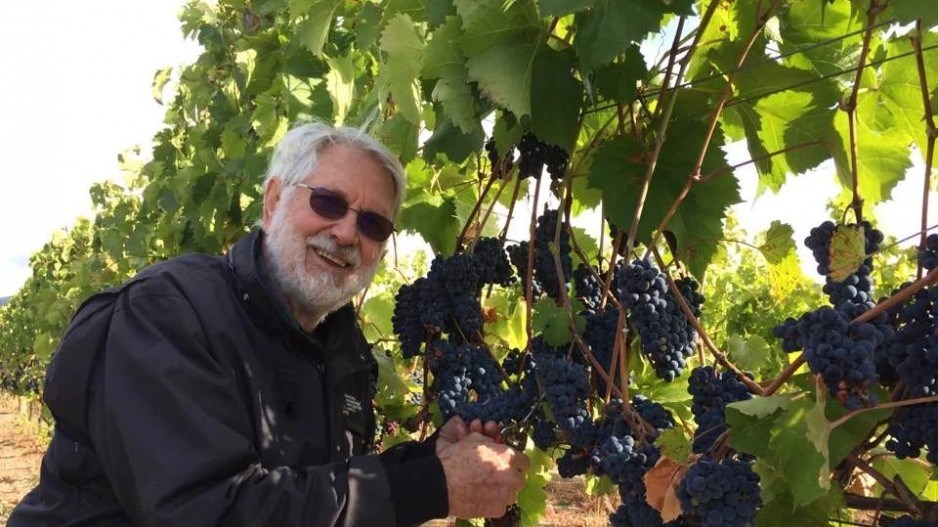ÎÚÑ»´«Ã½ wine industry business owners are facing what is likely to be the worst year many have seen for forest fire smoke. This comes as production is also crimped by a .
No winery is yet reporting major damage to property, although earlier this week noted that Niche Wine Co. had lost an equipment shed. Niche's co-owner Joanna Schlosser did not immediately respond to BIV's media request.
Celista Estate Winery owner Jake Ootes told BIV that fire came up to his 80-acre Shuswap property's edge. Ootes' acreage includes a 15-acre vineyard on which he grows Siegerrebe, Ortega and Marechal Foch grapes. The deep freeze in December 2022, when temperatures plunged below -30C for days in the Shuswap, stunted production of Ootes' Siegerrebe and Ortega vines. Forest-fire smoke from this week's blaze will render his Marechal Foch grapes unusable, he told BIV.
"The vineyard itself will be nonproductive because of smoke damage," said the 81-year-old, who has evacuated his property and is staying with family.
Ootes expects to be able to make wine from grape juice that he has bought from other growers. He also tanked and saved some of his own juice from last year. Even with that back-up plan, Ootes only expects that he will be able to produce about 1,800 cases of wine this year, down from 2,400 cases of wine last year.
The pain is likely to be widespread because the smoke is so extensive.
"I haven't seen smoke like this, for this long, in the valley ever," said longtime wind industry entrepreneur and former Tinhorn Creek Estate Winery owner Sandra Oldfield. "That's going to be a huge concern."
Wineries in recent years have suffered from smoke taint. Blue Mountain Vineyard & Cellars, for example, last year announced that it did not bottle its 2021 vintage.
Winemakers may have to be creative to bottle something worth putting their brand on, and selling. Oldfield told BIV that winemakers might make white wine from what are traditionally red-wine grapes by removing skins early in the winemaking process.
"You can make a white Cabernet [Sauvignon,]" she said. "It would be like a white Zinfandel that you had many years ago in California."
She suggested that winemakers this year might make more rosé wine because those wines need less contact between grape skins and the juice.
Winemakers in recent years have had to deal with more smoke taint. Okanagan-based mobile contractor Cellar Dweller has two technologies to help winemakers remove smoke taint, principal Robert Kwakernaak told BIV this summer. One of those technologies uses reverse osmosis, he said. The other uses what he called “a molecularly imprinted resin.”
Even with these technologies, or using the chemical bentonite, winery owners such as Signorello Estate's Ray Signorello have told BIV that results can be hit and miss.
Instead of trying to remove smoke taint from his 2020 vintage of Napa Valley wine, West Vancouver-based Signorello simply dumped the juice and did not make any of his Edge, S or Signorello Estate branded wines. The only wine he made that year were from other vineyards, or locations in California, such as Lodi, he told BIV this summer.
The hit ÎÚÑ»´«Ã½ wineries are now facing includes less tourism.
The province has ordered visitors not to visit parts of the Okanagan and Shuswap affected by fires. ÎÚÑ»´«Ã½'s Minister of Emergency Management and Climate Readiness Bowinn Ma, however, late this afternoon said in a statement that the order will be lifted for Kelowna, Kamloops, Oliver, Osoyoos, Penticton and Vernon starting tomorrow (Aug. 23.)
Ootes' 13-year-old winery, for example, is losing revenue by not selling wine at its tasting room because that facility is closed. He told BIV that before the wildfires, tourism to his winery was surpassing what he saw in 2019, before the COVID-19 pandemic limited travel.
Wine Growers BC CEO Miles Prodan told BIV that on average most ÎÚÑ»´«Ã½ winery owners have yet to see tourism to tasting rooms return to numbers that they saw pre-pandemic.
Despite the provincial order telling potential visitors to cancel hotel and campground reservations and stay away from the area, some wineries are open.
"Wineries would be unhappy if I said, 'All wineries are closed,' because there's no such blanket statement like that," he said.
"Most tasting rooms are open, and if not, they'll be closed temporarily out of abundance of caution, depending on where there are. There are many wineries up and down the valley that are still open, like down in Penticton and Osoyoos."
He advises potential visitors to phone ahead to ensure that the winery is open.
All of these business challenges in the ÎÚÑ»´«Ã½ wine sector may mean there is more interest in the November 15 Fortify conference and tradeshow, which Oldfield organizes annually.
"There are a lot of trade shows out there that talk a lot about the products you're making and how to make a better wine," she said. "This one is really talking about your business and how you can how you can run a better business."
Early bird tickets go on sale on Sept. 5 for $150 each. She estimated that capacity would be about 250 people.
"We've always been trying to give [attendees] a leg up when it comes to their business acumen and the resources they need to be successful in their business," she said.



